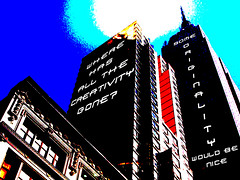
One of the advantages of teaching composition is
that ideas from class spill over into other aspects of my writing and
vice versa. Writing and teaching writing
feed off each other like a very small and mutually beneficial food chain.
For example, here’s a tidbit of writing wisdom
from my Comp I textbook: “Topics are worthless.”[1]
Instead of writing about the grandiose ideas every other student writes about, such as stem cell research or abortion, the authors encourage students to say something new about the most mundane of topics: why you dislike certain foods, how you overcame shyness, how you learned nothing from a boring history class.
In other words, the topic isn’t as important as what you
have to say about it.
The same logic applies to writing stories.
It’s been said that there are no original ideas. Even
the most successful books and films are based on well-traveled themes:
- Harry Potter is about a boy seeking to discover his special powers in an ordinary world.
- The Help is about women seeking to overcome prejudice.
- Most super-hero stories can be boiled down to good versus evil.
The trick, then, is to do something different with the
idea. Here are five tips to help you
forge new paths on a well-worn trail:
1. Ask yourself why you want to write about this idea in the first place. What attracted you to it? If you write about sparkly vampires, are you doing so because they’re popular right now or because they appeal to you in some other way? Would you write about them if they weren’t popular? (Hint: If the answer is no, perhaps you should write about something else.)
Classic comic book writers from the Golden and Silver ages steeped themselves in science fiction or just plain science. They drew from other fields to add something fresh to their stories.
Your truth is different from my truth or the truth of the person sitting next to you. That’s because we’ve all lived different lives. Tap into that well of uniqueness that is you and write about the one thing no one else knows: what it’s like to live your life.
Find the connections between your idea and something that seems unrelated. (Yes, I wrote “find” on purpose. Finding connections is better than inventing them. Invented connections can seem forced or phony.)
Everything is connected to everything else—the “six degrees” theory. Your task as writer is to discover those connections and connect the dots.
Finding something new to say about a timeworn topic or idea
can be challenging, but it’s also the most rewarding aspect of being a writer:
discovering that piece of originality that is not only inside you but is you.
[1]
Jack Rawlins and Stephen Metzger. The
Writer’s Way. 7th ed. Boston: Houghton Mifflin, 2009. 286. Print.








